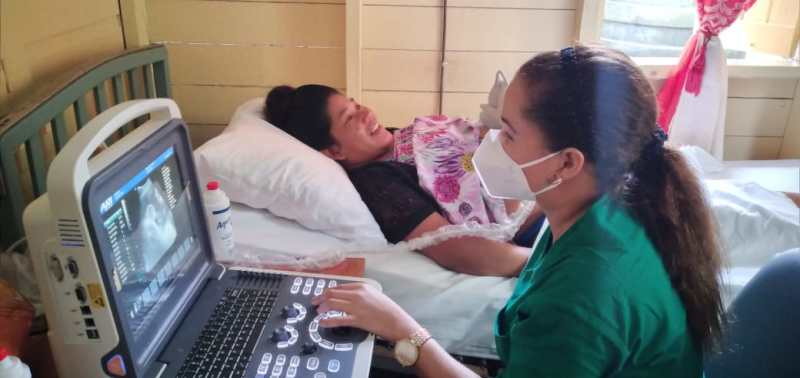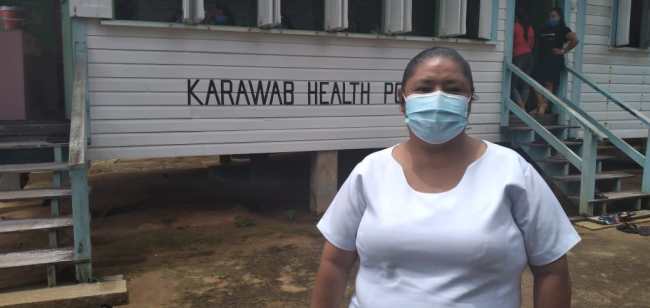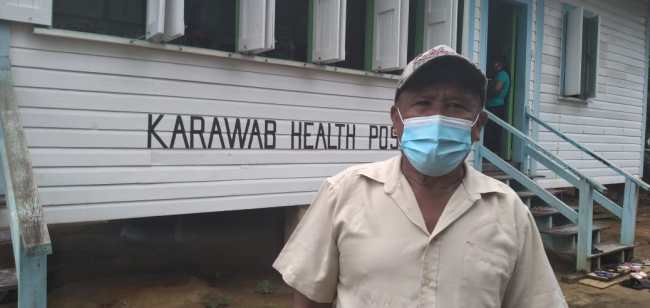
Expectant mothers in Karawab, Upper Pomeroon River on Friday benefited from ultrasound services, on the second day of the Ministry of Health’s specialist medical outreach to Amerindian communities in Pomeroon- Supenaam (Region Two).
Director General at the Ministry, Dr. Vishwa Mahadeo, who led the exercise, said persons in the remote satellite community had difficulties accessing health care.
“The residents from Karawab village especially pregnant mothers, for them to get ultrasound service, they would have had to come out of there and go to Suddie Hospital, so for them, bringing ultrasound to Karawab is very, very important, as you can see they have been here waiting since early morning,” he told DPI.
A total of 12 expectant mothers were given ultrasound scans, which are used to check on the development of the foetus, and to detect abnormalities and multiple pregnancies. Residents also benefited from other services such as diabetic foot care, Visual Inspection with Acetic Acid (VIA) screening for cervical cancer and optometry.
The team then headed further downriver to St. Monica’s Mission where seven expectant mothers were also given ultrasounds.
Nurse/Midwife and Medical Supervisor at St. Monica’s Mission and Karawab, Ms. Monica Samuels welcomed the initiative.
“This morning was very nice because it is very difficult for my mothers to go out to Suddie Hospital to do the ultrasound, most of the time we refer them there but they don’t go because of the money. They don’t have money to go. It’s $8000 in passage to go down to Charity return, and then to go up to Suddie is a next $2000, and if they return late to Charity, sometimes the boat leaves them. So, I am really happy about the ultrasound because my mothers cannot afford to go and do an ultrasound,” Nurse Samuels said.

The senior nurse who has held down the fort alone for approximately 19 years, recently welcomed the assistance of a Community Health Worker (CHW) and a cleaner for both communities, which each has a population of over 700.
“It is nice for me because working alone was difficult when I had to take a patient down to the hospital. At first, we used to paddle to take our patient down to Kabakaburi, then when we get boat and engine, it help us a lot but right now, we not getting gasoline.”
Nurse Samuels says the health post usually accesses the gasoline for home visits and emergencies through the regional office. However, that process has its own challenges and has now been further disrupted by the pandemic.
“From last year after Covid came in, only last year February we get gasoline, so it is really hard. The patients would have to buy gasoline for us to go out and then to get it back from the Region is real hard. So, I don’t go and collect gasoline anymore because you have to go sign a book at Suddie then go to Transport Division, then go to the Regional Office, then hire a vehicle to take up our containers, then hire a vehicle to bring down back the gasoline, so it is really hard,” she said.
Toshao of St. Monica and Karawab, Mr. Thomas Charles also lauded the Government initiative.
“I have been longing for this for a long time. We are very far from the hospital and it is very expensive to go out, so having this type of programme is very beneficial to us and I really want to thank the Government for this,” Toshao Charles said.

Following these visits, the team then joined another team at the Kabakaburi Health Post, which is about a 15-minute boat ride even further down the river. Similar services were provided here, much to residents’ appreciation. Several of them had braved the rains and had turned out in their numbers to see the specialists.
The outreach wrapped up on Saturday. The Region Two outreach followed closely on the heels of similar exercises held recently in Regions Nine and Ten.
(source: Department of Public Information)

